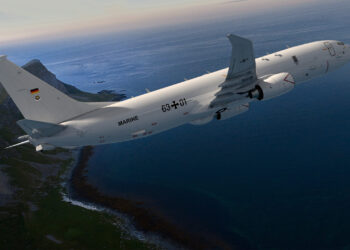US Navy,
MORGAN CITY: Military Sealift Command-chartered high speed vessel HSV-2 Swift (HSV 2) along with various embarked Navy, Marine Corps and Air Force units departed Louisiana Nov. 25 for a five-month deployment in support of Southern Partnership Station (SPS).
Southern Partnership Station is an annual deployment of various specialty platforms to the U.S. Southern Command area of focus in the Caribbean and Latin America. The mission's primary goal is information sharing with navies, coast guards and civilian services throughout the region.
“Southern Partnership Station provides an excellent opportunity to facilitate cooperation, interaction and communication between regional partners' civil and maritime services,” said Rear Adm. Joseph D. Kernan, Commander, U.S. Naval Forces Southern Command and U.S. 4th Fleet. “Working together alongside our partner nations, sharing knowledge and experiences through joint, multinational and interagency exchanges will help to build strong relationships, improve interoperability and enhance regional maritime security.”
Military training teams and subject matter experts embarked on Swift will provide partner nations with classroom and hands-on training in a variety of subjects.
“SPS provides us an opportunity to work with our friends, build partnerships and train together,” said Cmdr. Christopher K. Barnes, SPS mission commander.
The ship is scheduled to visit El Salvador, Panama, Nicaragua, Dominican Republic, Jamaica, Barbados and Colombia.
The mission is coordinated through U.S. Naval Forces Southern Command/U.S. Fourth Fleet (NAVSO/ 4th Fleet) with partner nations to meet their specific training requests. Swift embarked elements of the Navy Expeditionary Training Command from Naval Amphibious Base Little Creek, Va., Marine Corps Training and Advisory Group from Fort Story, Va., and Naval Criminal Investigative Service Security Training Assistance and Assessment Team.
Members of the Navy Expeditionary Training Command will provide instruction in small boat operations, maintenance and repair, boarding techniques, armed sentry, search and rescue, combat lifesaving, leadership principles for junior and senior partner nation enlisted service members, and instructor training.
The Marine Corps Training and Advisory Group will advise partner nation servicemembers on a variety of different topics including marksmanship, martial arts, and non-lethal weapons tactics.
Naval Criminal Investigative Service Security Training and Assessment Team will provide port security instruction and advice.
Information systems technicians will help install and instruct partner nation servicemembers on the use of Integrated Automatic Identification Systems (IAIS). IAIS is a computer based vessel identification program that provides ports and other ships with real-time location and information on friendly vessels within their region.
“This is a great system, I really like the way it works,” said Information Systems Technician 2nd Class German Rodriguez, IAIS instructor. “I'm excited to interact with our friends and show them the great things this system can do.”
As the Naval Component Command of SOUTHCOM, NAVSO's mission is to direct U.S. Naval Forces operating in the Caribbean, Central and South American regions and interact with partner nation navies within the maritime environment. Various operations include counter-illicit trafficking, Theater Security Cooperation, Humanitarian Assistance and Disaster Relief, military-to-military interaction and bilateral and multinational training.
Fourth Fleet is the numbered fleet assigned to NAVSO, exercising operational control of assigned forces in the SOUTHCOM area of focus.
Swift is under long-term charter to the U.S. Navy's Military Sealift Command. A crew of civilian mariners working for a private company under charter to MSC operate and navigate the ship.









